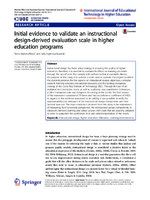Initial evidence to validate an instructional design-derived evaluation scale in higher education programs
Fecha
2016-02-26Autor
Espinoza-Guzmán, Julia
Moreira-Mora, Tania Elena
Metadatos
Mostrar el registro completo del ítemResumen
Instructional design has been a key strategy in ensuring the quality of higher education; therefore, it is essential to evaluate its effects on learning processes through the use of tools that comply with defined technical standards. Hence, the purpose of this study is to validate a scale used to evaluate the degree to which the students perceive the five aspects of instructional design: objectives, curricular content, learning activities, educational resources, and the existing evaluation strategy at the Costa Rica Institute of Technology (TEC). Through the use of an analytical and descriptive study, as well as qualitative and quantitative techniques, a Likert evaluation scale was designed. According to the results, the final version of the instrument consisted of 33 items and had a confidence coefficient of 0.923. In regards to the evidence associated to its validity, it was possible to verify the representability and relevance of the instructional design components and their factorial structure. The main conclusion obtained from this study is the importance of measuring, from a systemic perspective, the instructional design components, in classroom, blended learning and virtual courses with tools that are properly validated in order to guarantee the confidence level and valid interpretation of the results.
Fuente
Espinoza-Guzman, Julia, Moreira-Mora, Tania. "Initial evidence to validate an instructional design-derived evaluation scale in higher education programs". International Journal of Educational Technology in Higher Education. 201613:11Compartir
Métricas
Colecciones
- Artículos [9]
El ítem tiene asociados los siguientes ficheros de licencia:



